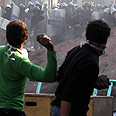Cairo is burning. The fire is spreading from Tahrir Square to the alleyways of the dense, poor, sweaty and frustrated Egyptian capital. Thus far, the Egyptian revolution did not only fail to make the lives of the people better, it made them more miserable.
Our southern neighbor lost tens of billions of dollars as result of the almost complete halt in tourism, the undermined gas exportation to Israel, the flight of foreign investors, the departure of international companies, the wave of strikes, and the spreading violence.
Cairo has turned into a dangerous, furious city, Alexandria is often in the dark, and public services are collapsing.
On the political front, the state of civil rights was somewhat improved compared to the Mubarak era, yet the media’s freedom of expression is still limited and subjected to the interests of the ruling military council. The dark security apparatuses were not dismantled and recruited numerous new agents.
The life of a student at the University of Cairo or a farmer on the banks of the Nile is more difficult today than it was a year ago. Both of them do not see hints of improvement on the horizon.
So Cairo is burning. The frustration shared by the vast majority of Egyptians seeks an outlet and finds it in the form of the supreme military council that took power. The mass demonstrations appear to be directed against the generals who rule the country, and these are the same generals who were in charge during Mubarak’s days as well.
However, behind the scenes, the Islamist parties pull the strings, either openly or surreptitiously. Their aim is to avert free elections via bloody riots. Because one thing did change in the post-Mubarak Egypt: It embarked on the path leading to a parliamentary democracy.
Radicals fear elections
The military junta set a date for multi-party elections for parliament, and later for the presidency, and intends to deliver on its promises. The first phase is slated to begin in about a week. This is a critical national test.
The leaders of the radical religious-political movements fear the experiment known as democratic elections. They are interested in absolute control, without elections. They are the loyal fans and representatives of political Islamic fascism.
However, not all Islamists want power without elections. There are more moderate figures who wish to follow the example of Turkey, which is indeed not a perfect democracy (far from it) but also not an Iran-style Islamic republic (far from it.)
However, the voices of these moderates are weakening. The radicals – who are organized, united and have an agenda – are growing stronger, or at least boosting their presence on the street. They are the ones who fear the people’s verdict at the ballot boxes, behind the curtain.
Any objective observer knows that the Egypt which will emerge after free elections will not be the natural continuation of the previous Egypt: Citizens who tasted free choice even once will not be giving it up easily.
The fork in the road faced by Egypt at this time is fateful not only for the country, but for the entire Arab-Muslim Middle East. Should the incited masses be able to crown the zealots among the Islamic Brotherhood as Egypt’s new rulers, without elections, without the need to vie for votes, and without the need to engage in coalition negotiations, Egypt will become the power base of Islamic fascism – which will turn into a substantive threat for the entire region.

















